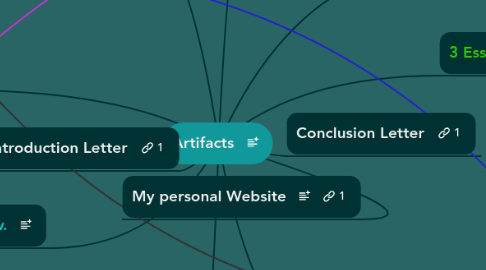
1. Slavery
1.1. Standard
1.1.1. WH Standard 5: Worldwide Exploration, Conquest and Colonization: 1450 to 1750
1.1.2. personal webpage
1.2. SWLO's
1.2.1. Work Ethic
1.2.2. Technology
1.2.3. Problem Solving
2. Cancer Video
2.1. Youtube link
2.1.1. Technology
2.1.2. Citizenship
2.2. Standard
2.2.1. Standard 1: Describe the interrelationships of emotional, intellectual, physical and social health
3. Industrial Rev.
3.1. Spinning Mule
3.2. Standard
3.2.1. Standard 6: Scientific, Political, Cultural and Industrial Revolutions: 1500 to 1900
3.3. SWLO's
3.3.1. Critical Thinking
3.3.2. Peer Collaboration
3.3.3. Communication
3.3.4. Work Ethic
4. Poems
4.1. Standard 5: WRITING: Applications
4.1.1. 10.5.8 Write for different purposes and audiences, adjusting tone, style, and voice as appropriate
4.1.2. 10.5.7 Use varied and expanded vocabulary, appropriate for specific forms and topics
5. Introduction Letter
6. My personal Website
7. Baby no Baby
7.1. Standard
7.1.1. Standard 1: Analyze how genetics and family history can affect personal health.
7.1.2. Health
7.2. Pedigree
8. 3 Essay
8.1. Standards
8.1.1. Standard 5: WRITING: Application
8.1.1.1. 10.5.1, 10.5.2, 10.5.3, 10.5.4
8.1.2. Standard 6: WRITING: English Language Conventions
8.1.2.1. 10.6.2, 10.6.3, 10.6.4.
8.2. Essays
8.2.1. Graduation Essay
8.2.2. Your School
8.2.3. Hero or Criminal Persuasive Essay
9. Parabola Video
9.1. Standard
9.1.1. Standard 4: Conic Section
9.2. Video link.
9.2.1. Peer Collaboration
9.2.2. Technology
9.2.3. Problem Solving
10. Time Capsule
10.1. Standard 7: LISTENING AND SPEAKING: Skills, Strategies, and Applications
10.1.1. 10.7.4 Use props, visual aids, graphs, and electronic media to enhance the appeal and accuracy of presentations
10.1.2. 10.7.6 Analyze the occasion and the interests of the audience and choose effective verbal and nonverbal techniques (including voice, gestures, and eye contact) for presentations
10.1.3. 10.7.11 Evaluate the clarity, quality, effectiveness, and general coherence of a speaker’s important points, arguments, evidence, organization of ideas, delivery, choice of words, and use of language.
